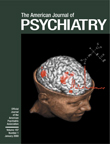Double-Blind Comparison of Addition of a Second Mood Stabilizer Versus an Antidepressant to an Initial Mood Stabilizer for Treatment of Patients With Bipolar Depression
Abstract
OBJECTIVE: This study’s purpose was to clarify the appropriate treatment of bipolar depression by comparing the addition of an antidepressant versus a second mood stabilizer for inpatients being treated with lithium carbonate or divalproex sodium. METHOD: Twenty-seven patients were randomly assigned to groups that received double-blind treatment with paroxetine or a second mood stabilizer (lithium carbonate or divalproex sodium) for 6 weeks. RESULTS: Both groups showed significant improvement in depressive symptoms during the 6-week trial. There were significantly more noncompleters in the group being treated with the two mood stabilizers than in the group being treated with a mood stabilizer and paroxetine. CONCLUSIONS: Both treatments appeared to be effective; however, the addition of an antidepressant may have greater clinical utility in the treatment of bipolar depression.



